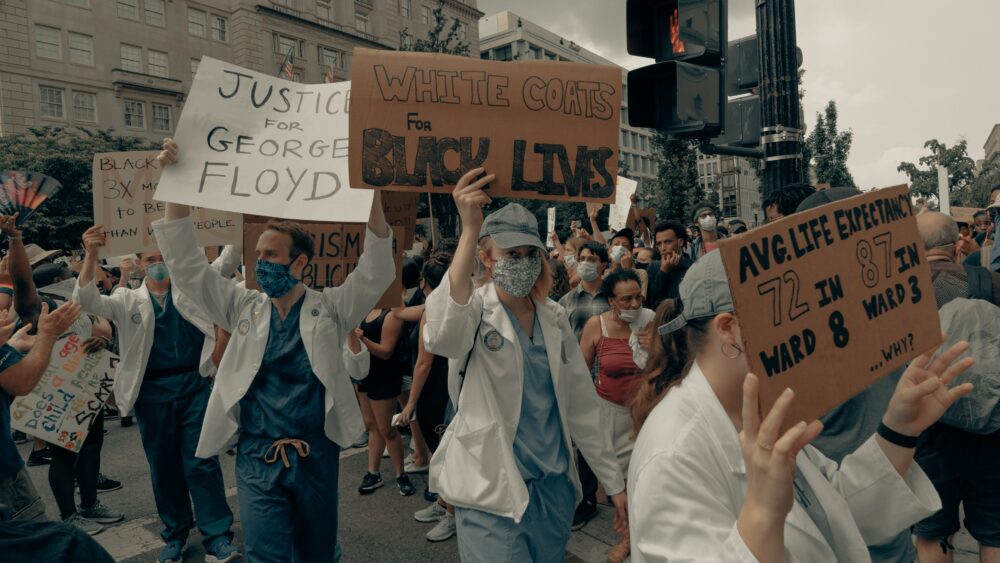
Written by Hannad Osman, Head of Membership on The Young People’s Advisory Board.
African Americans live within many intersections of American society and Covid-19 has highlighted how vulnerable the community is at the intersection between health and racism. Historically, the health sector is another area by which anti-black medical knowledge has been produced and implemented. US history, is one of systemic oppression, centuries of genocide and 336 years of slavery and legal segregation for 85% of the nation’s history. For example, in the 19th century white physicians and scientists conducted medical experiments on black women, such as that conducted by James Marion Sims the father of gynaecology, black women being the recurring victims of involuntary sterilization and hysterectomies. These are some examples of how mainstream medical knowledge is rooted in racist medical practices. These views towards African Americans in healthcare continue to persist and underlie the current subconscious bias towards the community in healthcare. The dehumanization of the African American community in medical policy has had intergenerational effects that were brought to the surface during the pandemic.
During the pandemic, the African American community were disproportionately affect by the combination of poor social policies, programs, unfair economic arrangements and bad politics.This mix resulted in African Americans experiencing the highest deaths, 20.9% of deaths and 18.2% COVID cases even though they constitute 13.4% of the United States population. Higher rates of comorbid illness (these are illnesses which co-occur with one another), more limited healthcare access, higher rates of disadvantageous labor market positioning and community and housing conditions. The pandemic exacerbates disparities African Americans have experienced as a result of the poor implementation of health policies. In the American healthcare system, hospitals still remain the main site for testing, treatment and the initial allocation of Covid-19 vaccine. The lack of access to treatment and vaccination is due to the costs of medical care, despite the implementation of the Patient Protection and Affordable Care Act (ACA) and Covid-19 economic relief laws. In 2016, the ACA reduce the number of non-elderly people uninsured by 20 million. However, 12 states, mainly in the South, are yet to adopt Medicaid expansion. These states are highly concentrated with Black residents. Although, on the surface both the ACA and Covid relief seems to reduce inequities to an extent, it was another means by which medical racism could continue to be exercised. Levelling out health inequities, cannot be sustainably achieved until the historical legacies of slavery and segregation in the medical field are adequately addressed.
This would lead people to question what effective, long-term policy solutions look like in health. Firstly, it would look like a true, dedicated effort to invest in public health institutions, in particular areas with a higher concentration of African Americans. For example, providing investment in primary care and community-based health care organizations that are at risk of closing indefinitely. Community health clinics and organizations, provide home visiting programs and provide essential primary care services to underserved communities that are a lifeline to many. Another solution is to invest in resources to address various social determinants of health. Any type of reform of the health care system must acknowledge that 70% of variation in health outcomes is tied to social determinants instead of the healthcare one receives. Variation in health is undoubtedly linked to housing instability, food deserts and income insecurity. A holistic outlook is required in order to effectively tackle the health inequities in the African American community.
Living through a pandemic has highlighted the continuation of historical legacies of health inequities and illustrates the need for young black people in the health care field to advocate and work towards minimising the gap. My role in the advisory group, is Head of Membership I am keen on recruiting more young people to create systemic change in healthcare. As a third year Pharmacy student, I am a strong believer for health policy needing to speak accurately to the needs of the people, by having a more diverse workforce in healthcare.
To get in touch or for more information about The Young People’s Advisory Board, feel free to contact us at info@tbpi.org. Feel free to follow us on Instagram and keep the conversation going @ypab_tbpi.
